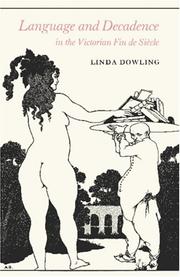| Listing 1 - 2 of 2 |
Sort by
|

ISBN: 140085833X 9781400858330 0691631026 0691014728 0691601283 Year: 1986 Publisher: Princeton, New Jersey : Princeton University Press,
Abstract | Keywords | Export | Availability | Bookmark
 Loading...
Loading...Choose an application
- Reference Manager
- EndNote
- RefWorks (Direct export to RefWorks)
As Dr. Dowling demonstrates, literary Decadence in this linguistic and cultural context was to reveal itself as a mode of Romanticism demoralized by philology. Decadent writers like Paler and Wilde and Beardslcy sought to preserve a few precious fragments from what they imagined--and paradoxically welcomed--as England's imminent decline and fall.Originally published in 1987.The Princeton Legacy Library uses the latest print-on-demand technology to again make available previously out-of-print books from the distinguished backlist of Princeton University Press. These editions preserve the original texts of these important books while presenting them in durable paperback and hardcover editions. The goal of the Princeton Legacy Library is to vastly increase access to the rich scholarly heritage found in the thousands of books published by Princeton University Press since its founding in 1905.
Decadence (Literary movement) --- Decadence (Literary movement). --- English literature --- Language and culture --- Linguistics --- Neogrammarians. --- Philology --- LITERARY CRITICISM / European / English, Irish, Scottish, Welsh. --- Junggrammatiker --- Leipzig School (Linguistics) --- Young grammarians --- Linguistic change --- Culture and language --- Culture --- Literary movements --- Literature, Modern --- History and criticism. --- History --- History and criticism
Book
ISBN: 0801468736 1322503540 0801468744 9780801468742 0801481708 0801429609 9780801429606 9780801481703 Year: 2014 Publisher: Ithaca, NY
Abstract | Keywords | Export | Availability | Bookmark
 Loading...
Loading...Choose an application
- Reference Manager
- EndNote
- RefWorks (Direct export to RefWorks)
In April 1895, Oscar Wilde stood in the prisoner's dock of the Old Bailey, charged with "acts of gross indecency with another male person. These filthy practices, the prosecutor declared, posed a deadly threat to English society, "a sore which cannot fail in time to corrupt and taint it all." Wilde responded with a speech of legendary eloquence, defending love between men as a love "such as Plato made the very basis of his philosophy, and such as you find in the sonnets of Michelangelo and Shakespeare." Electrified, the spectators in the courtroom burst into applause. Although Wilde was ultimately imprisoned, the courtroom response to his speech signaled a revolutionary moment-the emergence into the public sphere of a kind of love that had always been proscribed in English culture. In this luminous work of intellectual history, Linda Dowling offers the first detailed account of Oxford Hellenism, the Victorian philosophical and literary movement that made possible Wilde's brief triumph and anticipated the modern possibility of homosexuality as a positive social identity. A homosocial culture and a language of moral legitimacy for homosexuality emerged, Dowling argues, as unforeseen consequences of Oxford University reform. Through their search in Plato and Greek literature for a transcendental value that might substitute for a lost Christian theology, such liberal reformers as Benjamin Jowett unintentionally created a cultural context in which male love-the "spiritual procreancy" celebrated in Plato's Symposium-might be both experienced and justified in ideal terms. Dowling traces the institutional career of Hellenism from its roots in Oxford reform through its blossoming in an approach to Greek studies that came to operate as a code for homosexuality. Recreating the incidents, controversies, and scandals that heralded the growth of Hellenism, Dowling provides a new cultural and theoretical context within which to read writers as diverse as Wilde, Jowett, John Addington Symonds, Walter Pater, Lord Alfred Douglas, Robert Buchanan, and W. H. Mallock.
Gay men --- Classicism --- Greek philology --- Homosexuality and literature --- English literature --- Gays, Male --- Homosexuals, Male --- Male gays --- Male homosexuals --- Urnings --- Gays --- Men --- Pseudo-classicism --- Aesthetics --- Literature --- Civilization, Classical --- Classical philology --- Greek language --- Greek literature --- Literature and homosexuality --- History --- Study and teaching --- History and criticism. --- Oxford (England) --- Rhydychen (England) --- Oxford (Oxfordshire) --- Social life and customs.
| Listing 1 - 2 of 2 |
Sort by
|

 Search
Search Feedback
Feedback About UniCat
About UniCat  Help
Help News
News